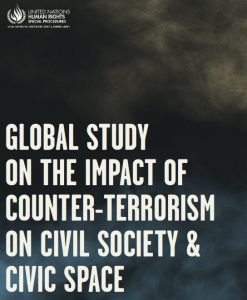UN publishes Study on the Impact of Counter-Terrorism on Civil Society & Civic Space
26.06.2023 I “Societies where civil society is absent, afraid, cowed, and unable to emerge are societies made weaker, less participatory, and vulnerable to the conditions conducive to terrorism and violence.”
The United Nations Special Procedures of the Human Rights Council, independent human rights experts who report and advise on country situations or thematic issues in all parts of the world, have published a study on the impact of counter-terrorism on civil society and civic space.
The study was made possible by the german cooperation of the Government of Germany, Misión Permanente de Espana ante las Naciones Unidas of the Government of Spain, the Friedrich-Ebert-Stiftung, the Human Rights Centre of the University of Minnesota and The International Centre for Non-Profit-Law.
The study’s executive summary describes best it’s urgency:
“The Global Study centers the daily, lived experiences for civil society from across the globe operating amidst closing civic space and the widespread misuse of counter-terrorism and preventing and countering violent extremism (P/CVE) measures to restrict their exercise of human rights and fundamental freedoms and curb their legitimate activities. The Study builds from the ground-up in the collection and collation of data driven by civil society, including through a participatory, civil society-engaged-and-led process— comprising 13 civil society consultations across regions, 108 written inputs, including 76 by civil society, and 2 civil society surveys—alongside a commitment to mainstream gender equality and women’s rights from its inception.”
[…]
The Study is grounded in recognizing the enormous benefits that an active, diverse, functional, and vibrant civil society brings to communities and societies. Societies where civil society is absent, afraid, cowed, and unable to emerge are societies made weaker, less participatory, and vulnerable to the conditions conducive to terrorism and violence. Despite the virtues and benefits of fostering civil society and the civic space that accompanies it, both have experienced significant challenges across the globe in recent decades.”
Clément Nyaletsossi Voule (United Nations Special Rapporteur on the rights to freedom of peaceful assembly and of association): “This Global Study is greatly needed to shed a light on a very worrying trend we witness around the globe of States instrumentalizing counter-terrorism measures to repress, criminalize and stigmatize activists, civil society members and organisations, and entire protest movements.”
>> More information on the shrinking civic space
>> Symposium July 2023 “The Civic Space in Europe – Shrinking, Growing, Enhancing?”






